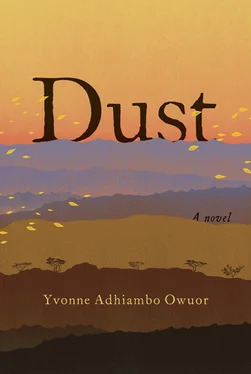It didn’t come.
The world rolled on, but not before consecrating Nyipir to its whims, Nyipir, who clutched a bloodied sack, as if it contained all the densities of night. Much, much later, Nyipir’s mind watched life shutting down on itself inside the pitch of human screams: Ngai, Ngai, Ngai . God, God, God. Of passes issued to souls with blank eyes who volunteered names in exchange for peace, peace alone (the pass read, “ Mwigito wa kwihonokia ukineana … uyu ukuuite ‘bathi’ ino arinda ”—The bearer of this pass wishes to surrender). Of wondering how a people could harbor a malignant presence that would devour children, and not scream out, not even once. Of trying not to scratch himself out of his skin, because this could not be the meaning of life.
Yet.
He knew he might endure all this so that he could go to Burma and bring his father and brother home. He could endure this world, he realized, so that, in defiance of intent, a murdered dreamer named Aloys Kamau might borrow eyes to still look upon a life that had been severed from him.
Months later, a special “processing” station was built to manage the national crisis. The base at Athi River sought trustworthy hands. An officer slapped a band on Nyipir’s upper arm and sent him over to the plains. On his way to Athi River by train, Nyipir glimpsed Nairobi at sunset and thought of Burma.
At the secretly located Athi River station, Nyipir’s tasks were simple: join seven other men and stare at inmates in cells, no words.
“What kind of job is this?” he asked a short man.
“Are you being paid?” the man asked.
“Yes, sir,” said Nyipir.
“Then why question?”
Concentrated silence drowned the hardest of men.
Faces he contemplated every day burned themselves into Nyipir’s nights, and would start conversations as he slept that had not been possible during the day. He began to dread both day and night. Some nights, to postpone sleep, Nyipir wrote long letters to Baba Jimmy. He told of stages of light in human eyes. Akia kata nying’ gi , he wrote. The body of a human cannot live without kindness. When it meets hatred, it stops trusting its life. This is what weakens men . Nyipir did not write that because of the ugliness in the stillness of the plains, he was unable to play the mouth organ and had kept it away in a crevice of his suitcase. He wrote, I will find Baba and Theo. To be so far from home cannot be good. I’ll go to Burma . He did not write that Burma meant he could forget the things he had seen and done. Nyipir signed off his letter. An wuodi, Nyipir . If Baba Jimmy sent a reply, Nyipir never got it.
“Mwigito wa kwihonokia ukineana … uyu ukuuite ‘bathi’ ino arinda”— The bearer of this pass wishes to surrender. A new man, an officer named Hugh Bolton, came to join the study of lives belonging to the documentation Nyipir issued: “ Ne ûndû wa kûhonokia ûtûro wake ”—For the salvation of his soul.
In the Kalacha heat, within a partly dug grave, gasping for air, for the first time Nyipir wonders where the pass holders went after the compromises had been made and the names they had listed had been made dead. If I should speak, may the oath kill me .
Sipping air.
Some silences cut off breath.
Even under oath.
THE CITY’S SUN IS SOFT AND WHISPERY. BEAUTIFUL NAIROBI people dodge the newspaperman burdened with four versions of the previous day’s news. At the Book Centre, Ajany has filled a supermarket trolley with watercolors, pastels, paper, brushes, molding clay, anything and everything arty. She had already made photocopies of a zoomed-in portion of a photograph. She pursed her lips at the one hundred copies of Odidi.
On her way out of the mall, she slips into the ladies’ toilet. Shifting feet. A cubicle becomes vacant. Out steps a buxom, fluffy-haired, expertly painted, open-mouthed woman in a too-tight white sweater dress. Agalo? Ajany dives into the stall. She has no energy to summon school-day memories. The sound of an air freshener being sprayed. Ten minutes. The woman should have gone. Ajany opens the door, makes for the faucets. Blueberry liquid soap. Rubs her hands.
The outside door squeaks open.
The woman pounces. “Araaaabel!” A squeal.
Face in the mirror.
Ajany blinks at it. “Agalo?” She suppresses a flicker of terror when she confirms the presence of one of a clique of popular girls she had spent her school years avoiding.
The woman lurches toward Ajany, and they squeeze each other in an insincere hug.
Agalo, who still speaks with exclamation marks, yells, “You! Came back! Must tell Alfred! Remember Alf! Where’s Odidi! What do you do! I’ve three sons! You?!”
A breeze of mint-scented spirits.
It is not yet noon.
Ajany considers the window. They are on the third floor. It would be a long way down.
“Are my eyes red?” Agalo spins toward the mirror, sniffs. “Nairobi flu.”
Ajany edges toward the door.
Agalo grabs her arms. “A quick coffee? Dormans?”
Ajany pulls away. “I–I w-was …” Ajany points in a vague direction.
“Oh, one cup.” Agalo rushes Ajany down escalators, talking all the time. They come to a stop where three other women lounge. One of them, with red talons — there is no other way to describe what she has done to her nails — is in the middle of an argument. Agalo interrupts. “Look who I found! Arabel. Remember Shifta the Winger? His sister!”
“Ohhhhh!”
They look past Ajany into recollections of respective teen crushes on Odidi. “Where’s Shifta now?” drawls a woman whom Ajany cannot remember.
“Traveling,” Ajany says. She plunks down her bags of art materials and inhales.
Agalo trills, “What’ll you have, hon?”
“Masala tea.” Ajany slumps into the chair, planning her escape, just as she used to when this same gang of girls stopped her at school under one pretext or another, usually to do with access to Odidi as his star ascended. She scrunches her nose. Exhales at the unrepaired past. Notes the paraphernalia of their present lives: small technology idols — phones, beeping, purring, bleeping objects that expect to be fondled mid-conversation, pieces of a shape-changing land with grand fiberoptic tentacles plugging into old histories that refuse to rest in peace. Ajany listens. One woman’s words are fringed with New Age positivity as she debates an activist. “If we breathed more and grounded our being, connecting to the womb of the earth, and looked upon each other with kind eyes, we would feel that we are already one.”
“Are you ‘one’ with me?” the thick-dreadlocked activist chortles as she drops an effervescent tablet into her concoction. She lifts the blend to her mouth. “Yeah, so visualize shit as gold, gaze at the red bums of baboon politicians and imagine them as dung beetles!” She gulps down her mixture in one long swallow and burps.
The Nairobi New Ager says, “Eat more greens, you’ll be less angry … and … raw .” She pulls out a tiny leleshwa-and-jasmine scent bottle and sprays the blended essence on her wrists, inhaling the pungent goodness. It wafts over everyone.
The activist sneezes and continues as if with the quotation marks of irony. “Sister,” she says, her arms curving into the shape of an Ankole cow’s horn, “even when a cockerel wears a turban it’ll never be a Sikh!” An exclamation mark’s triumph. “Greens! Kenya’s choking, and you, with your ati —‘lavender essence’—she makes two air-scratching movements—“and hordohordo English … you … blood-drinker, as if we don’t know about your secret oath-gobbling covens. Eat greens, you tell the rest of us?” She glares at everybody around the table, mouth working as if she were a gasping fish. She drops her head and plows into her salad with endless fingers that dangle on too-thin wrists.
Читать дальше











